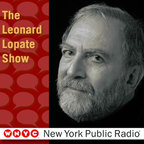
Please Explain from WNYC New York Public Radio
Summary: From WNYC, New York Public Radio: Please Explain, where Leonard Lopate and a guest get to the bottom of one complex issue. History, science, politics, pop culture or anything that needs some explanation!
- Visit Website
- RSS
- Artist: WNYC-FM
- Copyright: Copyright 2007 WNYC New York Public Radio
Podcasts:
This week we'll take a look at the creepy crawly world of spiders. Dr. Norm Platnick, curator emeritus in the Museum's Division of Invertebrate Zoology, and Hazel Davies, Associate Director of Living Exhibits at the American Museum of Natural History, talk about spiders, which are among the most versatile animals on the planet--they're able to inhabit every continent but Antarctica and are able to survive in environments that range from deserts to rainforests to crowded cities. There's an exhibition at the American Museum of Natural History called "Spiders Alive!" It's on view through December 2.
Pigeons seem to be everywhere in New York City, and they fill city squares in London and Venice. We'll take a look at why these birds thrive in urban areas around the word and how they're able to find their way home from hundreds of miles away. Andrew Blechman, managing editor of Orion magazine and author of Pigeons: The Fascinating Saga of the World's Most Revered and Reviled Bird, and Courtney Humphries, author of Superdove: How the Pigeon Took Manhattan...and the World, join us.
The practice of meditation has existed for some 2,500 years. David McKeel, Director of Practice & Education at Shambhala Meditation Center of New York, and Dr. Norman E. Rosenthal, clinical professor of psychiatry at Georgetown Medical School and author of Transcendence: Healing and Transformation through Transcendental Meditation, tell us what meditation is, how it works, and the research into its health benefits.
More than 100 athletes have been banned from competing in the London Olympics because of doping suspensions. Doping allegations have become common in many sports, most notably in cycling, baseball, and track and field. Dr. Dennis Cardone, Associate Professor in the Department of Orthopedic Surgery at? New York University Medical at Trinity Center, and Dr. Gary Wadler, Clinical Associate Professor in the Department of medicine at Hofstra University, explain how performance-enhancing drugs work, how they're detected, and how doping has been addressed in sports. Dr. Wadler served as the Chairman of the World Anti-Doping Agency's (WADA) Prohibited List and Methods Sub-Committee and serves as an ex-officio member of WADA's Health, Medicine, and Research Committee. He is the lead author of the textbook Drugs and the Athlete.
Early this month, researchers at CERN, the European Organization for Nuclear Research, announced that they found convincing evidence of a new particle called the Higgs boson. Sometimes called the "god particle," the Higgs boson gives mass to the elementary particles that make up the universe. Brian Greene, Professor of Mathematics and Physics and author of The Elegant Universe, The Fabric of the Cosmos, and The Hidden Reality, and Kyle Cranmer, Assistant Professor of Physics at New York University, help us decipher what the Higgs is and why it matters, and explain how the Large Hadron Collider works.
Artificial sweeteners are thought to be a billion dollar industry. On today's Please Explain, Dr. Maudene Nelson director of Community Outreach at Columbia University Institute of Human Nutrition, talks about how these non-sugars work. We'll find out about artificial sweeteners and low- and no-calorie sugar substitutes like aspartame, saccharin, and sucralose and why they still taste sweet on the tongue.
Obsessive-compulsive disorder is characterized by anxiety and unreasonable thoughts and fears that lead to repetitive behaviors. Trying to ignore or stop these thoughts often only increases distress and anxiety, and people who suffer from OCD? feel driven to perform compulsive acts to reduce or ease feelings of stress and anxiety. Dr. Helen Blair Simpson, Professor of Clinical Psychiatry at Columbia University Medical Center and the Director of the Anxiety Disorders Clinic at the New York State Psychiatric Institute, and Dr. Tamar Chansky, Founder and Director of the Children's Center for OCD and Anxiety in Plymouth Meeting, Pennsylvania, join us to explain symptoms, treatment, and how to cope with the disorder. Dr. Chansky is the author of Freeing Your Child from Obsessive-Compulsive Disorder.
Tattoo artist Scott Campbell, of Saved Tattoo in Williamsburg, Brooklyn, and Dr. Lars Krutak, of the Department of Anthropology at the Smithsonian Institution, discuss the history of tattoos and body decorations, the mechanics of getting a tattoo, the art of tattoo design, and how they can be removed.
Tax-advantaged accounts like the 401(k), 403(b), and 457 plans are popular ways to invest money for retirement, but unlike traditional pension plans, these plans require people to manage their investment strategies yourselves. Eleanor Laise, Editor, Kiplinger's Retirement Report, and Anthony Webb, research economist at the Center for Retirement Research at Boston College, discuss how these plans work, how best to manage them, and how to plan--and save--for retirement.
Patsy Brannon, Professor of Nutrition, Cornell University explains what vitamins do and which are most important.
Nick Paumgarten, staff writer for The New Yorker, explains what drones are, how they work, and the technological advancements that are making drones more prevalent in military and civilian life. He's the author of "Here's Looking at You" in the May 14 issue of The New Yorker.